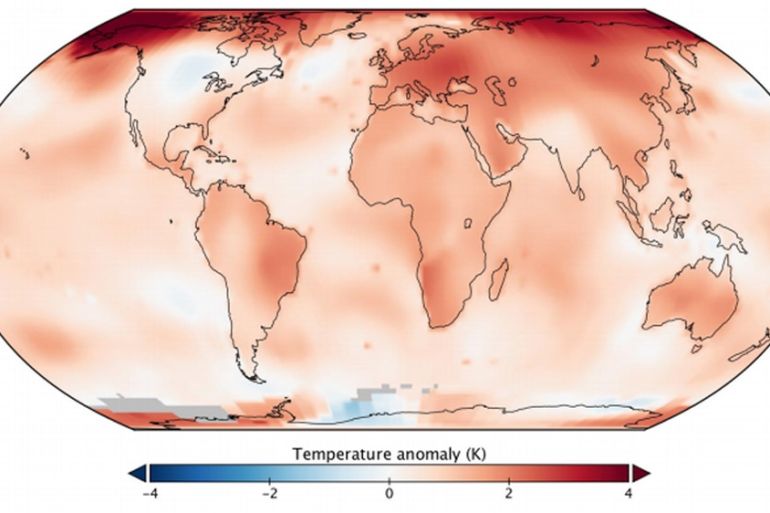Hot Earth: NOAA says the last five years were planet’s warmest
US atmospheric agency also says that ocean heat content is the highest in recorded history.

An annual climate report released on Wednesday by the United States government says that 2019 was the second-hottest year on record and that all five of the world’s warmest years have occurred since 2015, which echoed previous research by the United Nations.
The findings by the National Oceanic and Atmospheric Administration (NOAA) within the US Department of Commerce show that ocean heat content contributing to sea-level rise is higher than ever, with the Earth’s warming unabated.
Keep reading
list of 4 itemsThousands protest against over-tourism in Spain’s Canary Islands
Deadly Sahel heatwave caused by ‘human-induced’ climate change: Study
After the Hurricane
With analysis from scientists at NOAA’s National Centers for Environmental Information (NCEI), the report said that 2019 was the 43rd consecutive year with both ocean and land temperatures above average.
“It’s very alarming, because we’re seeing the trend for global temperatures continuing to increase,” said Ahira Sanchez-Lugo, a scientist at NCEI’s Center for Weather and Climate Prediction.
But Sanchez-Lugo also told Al Jazeera that the results – highlighting a severe climate crisis – were expected.
“As a climate scientist, this is not surprising,” she said. “The climate is changing, has changed. And eventually the record will get broken again.”
“We try to relay information to the public to help them understand,” Sanchez-Lugo added. “Our goal is to provide the facts and the data. We’re like global doctors, constantly recording the Earth’s vitals.”
‘Critical’ information
John Bateman, a spokesman for NOAA’s Satellite and Information Service, said at a press briefing on Wednesday that the new report should “help government and business leaders with critical decision-making”.
The mean temperature reading last year rose 1.15 degrees Celsius (2.07 degrees Fahrenheit) above the pre-industrial average.
NASA scientists conducted a separate analysis but came to the same conclusions, establishing that 2010-2019 was the hottest decade ever.
The World Meteorological Organization also labeled 2019 the second warmest for the planet, while scientists with the United Kingdom Meteorological Office said 2019 was one of the top three hottest years ever.

Meanwhile, sea ice continues to disappear at an alarming rate, with both the Arctic and Antarctic oceans recording their second-smallest coverage since 1979.
Sea surface temperatures averaged the second-highest on record, just behind 2016 and adding to the litany of evidence that the environment is struggling to maintain equilibrium.
Deke Arndt, chief of the NCEI’s global monitoring branch, said, notwithstanding a major geophysical event, that he was “almost certain the [next] decade will be even warmer than the previous one”.
‘Human contribution’
Gavin Schmidt, director of NASA’s Goddard Institute for Space Studies in New York City, said that warming occurred “pretty much everywhere on the globe”.
Parts of Asia, Australia, southern Africa, central Europe, Alaska, Mexico and eastern South America posted record-high land temperatures in 2019.
“The issue of attribution is slightly different from the issue of monitoring,” said Schmidt. “What we look for are fingerprints of change. We throw them all into the mix, not just in the global mean, but also spatial patterns.”
Schmidt said that “what would be statistically possible with just natural forces is not capable of explaining the change”, describing the discrepancy as due to “the human contribution: changes in greenhouse gases and deforestation”.
“All of the trends are effectively anthropogenic at this point,” he said.